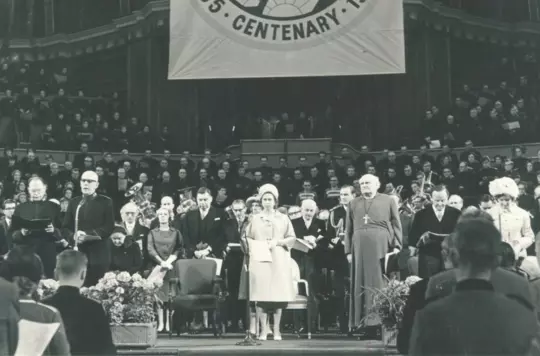23 September 2022
Love Divine: Deep truths from the Queen’s funeral
Major Peter Farthing

Major Peter Farthing reflects on one of the hymns sung at Queen Elizabeth II’s funeral.
Queen Elizabeth II’s funeral service, watched by billions around the world, reminded many that the Queen was a person of deep faith.
Watching the service on television, it was moving to hear Scripture spoken to billions, especially the first dramatic reading by Baroness Scotland, the secretary-general of the Commonwealth. And, of course, the architecture of Westminster Abbey sent its own message around the globe, hinting at the majesty of God.
And then there was the final song, ‘Love Divine, All Loves Excelling’ (SASB 262). The Queen chose the song herself, and it is as rich an expression of Wesleyan theology as you could hope to find – and, therefore, of Salvation Army theology too.
The author, Charles Wesley, was an Anglican. He had a brother named John who was the even more famous evangelist and teacher. John taught Christian truth through sermons, Charles through songs. ‘Love Divine’ was first published in 1747 and all sorts of Christian churches have sung it since.
The theology behind the song
‘Love Divine’ is above all a song of praise. Like the arches in Westminster Abbey, it soars.

As I read it, we sing to Jesus. Some think he is the focus of the first verse, with the Holy Spirit the focus of the second and the Father the third. Certainly, though, we sing to Jesus:
Love divine, all loves excelling,
Joy of Heaven, to Earth come down.
That is how we address him: ‘Love divine.’ Right at the start we begin to let go in praise and think big – Jesus, divine love, excelling all other loves. It is entirely typical of Charles Wesley to emphasise the love of God.
And, of course, he is the ‘joy of Heaven to Earth, come down’. There in that line is the great doctrine of the incarnation, of the eternal Son of God becoming flesh and blood.
Why did he come down? Jesus himself said it was ‘to give his life as a ransom for many’ (Mark 10:45). And by doing that he made it possible for God to make them right with himself.
Wesley gets us to celebrate that aspect of his salvation in this song – the new birth that Christ gives.
And that is why, as we sing, we say to Jesus: ‘Fix in us thy humble dwelling.’ Make your home in us. Come and live in our hearts. Settle down. And Jesus, if you are already there, stretch out in the house of my life. Fix in me – deep in me – your home.
The second verse picks up:
Come, almighty to deliver,
Let us all your grace receive.
Here, there is no display of personal virtue. The Archbishop said the Queen would live eternally, but not because she had lived well on Earth. As we sing, we do not rely on that. We bring nothing but our need: we are beggars asking for bread, the blind asking to be healed.

Suddenly return, and never,
Never more thy temples leave.
The ‘suddenly’ is the new birth when the Spirit of God returns to the human life. Christians vary a little in the way they understand this regeneration, but this is how the Wesleys saw it: that God regenerates as he justifies, forgives and reconciles. Suddenly return, Lord Jesus! Really come into my life. Make me a temple for your presence.
Thee we would be always blessing,
Serve thee as thy hosts above;
Pray and praise thee without ceasing,
Glory in thy perfect love.
And then the third verse begins with a prayer for holiness. What does God want to do in his new creations? When he gives that new birth, God makes ‘a vast inward change’, said John Wesley. Does God then stop his work in us? No, he doesn’t. We sing:
Finish then thy new creation,
Pure and spotless let us be.
Now some might think Charles promised too much when he said we can be pure and spotless. But all Christians can pray that prayer. Finish your work, Lord! Purify my mind. Give me a Christlike heart. Restore the image of God more and more in me.
Let us see thy great salvation,
Perfectly restored in thee.
Salvation, said John Wesley, is more than being forgiven and going to Heaven when we die. Salvation includes ‘a present deliverance from sin, a restoration of the soul to its primitive health, its original purity, a recovery of the divine nature, the renewal of our souls after the image of God in righteousness and true holiness, in justice mercy and truth’.
Paul wrote about this: ‘And we all, who with unveiled faces contemplate the Lord’s glory, are being transformed into his image with ever-increasing glory, which comes from the Lord, who is the Spirit’ (2 Corinthians 3:18). And we sing, Jesus, let me be:
Changed from glory into glory,
Till in Heaven we take our place.
Keep refining me, Lord. Keep growing your love in my heart and mind. As CS Lewis wrote: ‘The job will not be completed in this life: but he means to get us as far as possible before death.’ Before ‘in Heaven we take our place’.
Till we cast our crowns before thee,
Lost in wonder, love and praise.
- Major Peter Farthing has just released the course Foundations of Salvation Army Teaching, which is available free for corps and small groups to use at ourpeoplemedia.com.
Written by

Major Peter Farthing
Retired, Australia Territory
Discover more

The Queen's faith
Salvationist magazine looks back on how Her Majesty Queen Elizabeth II testified to being a follower of Jesus.

In pictures: Volunteers mobilise to serve emergency services, military and mourners
The Salvation Army offers support as thousands pay their respects to Her Majesty Queen Elizabeth II.

The Queen and the Army: 'A shared sense of service'
Ivan Radford traces the Christian values that connected Queen Elizabeth II and The Salvation Army.

A tribute to Her Majesty Queen Elizabeth II
A message from Territorial Commander Commissioner Anthony Cotterill.